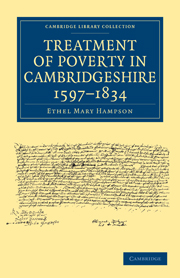Book contents
- Frontmatter
- Contents
- LIST OF ILLUSTRATIONS
- Preface
- EDITOR'S PREFACE
- CHAPTER I INTRODUCTORY: POOR RELIEF IN CAMBRIDGESHIRE BEFORE 1597
- CHAPTER II POOR RELIEF IN CAMBRIDGE DURING THE FIRST PART OF THE SEVENTEENTH CENTURY
- CHAPTER III POOR RELIEF IN WISBECH DURING THE FIRST PART OF THE SEVENTEENTH CENTURY
- CHAPTER IV POOR LAW ADMINISTRATION IN THE RURAL AREAS DURING THE FIRST PART OF THE SEVENTEENTH CENTURY
- CHAPTER V WAGE PROBLEMS. THE PROFITABLE EMPLOYMENT OF THE POOR. FIRST PHASE OF THE MOVEMENT
- CHAPTER VI HOUSING PROBLEMS AND PAUPER LABOUR IN CAMBRIDGESHIRE IN THE EARLY EIGHTEENTH CENTURY. THE ISLE OF ELY AND THE STATUTE OF 1723
- CHAPTER VII THE WORKHOUSE MOVEMENT IN THE TOWNS OF CAMBRIDGE AND ROYSTON, 1723–1785
- CHAPTER VIII THE WORKHOUSE MOVEMENT IN RURAL CAMBRIDGESHIRE, 1723–1785
- CHAPTER IX THE URBAN WORKHOUSES OF CAMBRIDGESHIRE, 1785–1834
- CHAPTER X THE RURAL WORKHOUSES OF CAMBRIDGESHIRE, 1785–1834. PARLIAMENTARY REPORTS OF 1804 AND 1834
- CHAPTER XI SETTLEMENT AND REMOVAL, 1660–1834
- CHAPTER XII PAUPER APPRENTICESHIP
- CHAPTER XIII BASTARDY
- CHAPTER XIV RELIEF OUTSIDE THE WORKHOUSE, 1660–1782
- CHAPTER XV RELIEF OUTSIDE THE WORKHOUSE, 1782–1834
- CHAPTER XVI CONSTITUTIONAL STRUCTURE AND SOCIAL POLICY
- CHAPTER XVII CONCLUSIONS
- APPENDIX
- MS. Sources and Bibliography
- Index of Names
- Index of Places
- Index of Special Subjects
- Plate section
CHAPTER XIV - RELIEF OUTSIDE THE WORKHOUSE, 1660–1782
Published online by Cambridge University Press: 07 September 2010
- Frontmatter
- Contents
- LIST OF ILLUSTRATIONS
- Preface
- EDITOR'S PREFACE
- CHAPTER I INTRODUCTORY: POOR RELIEF IN CAMBRIDGESHIRE BEFORE 1597
- CHAPTER II POOR RELIEF IN CAMBRIDGE DURING THE FIRST PART OF THE SEVENTEENTH CENTURY
- CHAPTER III POOR RELIEF IN WISBECH DURING THE FIRST PART OF THE SEVENTEENTH CENTURY
- CHAPTER IV POOR LAW ADMINISTRATION IN THE RURAL AREAS DURING THE FIRST PART OF THE SEVENTEENTH CENTURY
- CHAPTER V WAGE PROBLEMS. THE PROFITABLE EMPLOYMENT OF THE POOR. FIRST PHASE OF THE MOVEMENT
- CHAPTER VI HOUSING PROBLEMS AND PAUPER LABOUR IN CAMBRIDGESHIRE IN THE EARLY EIGHTEENTH CENTURY. THE ISLE OF ELY AND THE STATUTE OF 1723
- CHAPTER VII THE WORKHOUSE MOVEMENT IN THE TOWNS OF CAMBRIDGE AND ROYSTON, 1723–1785
- CHAPTER VIII THE WORKHOUSE MOVEMENT IN RURAL CAMBRIDGESHIRE, 1723–1785
- CHAPTER IX THE URBAN WORKHOUSES OF CAMBRIDGESHIRE, 1785–1834
- CHAPTER X THE RURAL WORKHOUSES OF CAMBRIDGESHIRE, 1785–1834. PARLIAMENTARY REPORTS OF 1804 AND 1834
- CHAPTER XI SETTLEMENT AND REMOVAL, 1660–1834
- CHAPTER XII PAUPER APPRENTICESHIP
- CHAPTER XIII BASTARDY
- CHAPTER XIV RELIEF OUTSIDE THE WORKHOUSE, 1660–1782
- CHAPTER XV RELIEF OUTSIDE THE WORKHOUSE, 1782–1834
- CHAPTER XVI CONSTITUTIONAL STRUCTURE AND SOCIAL POLICY
- CHAPTER XVII CONCLUSIONS
- APPENDIX
- MS. Sources and Bibliography
- Index of Names
- Index of Places
- Index of Special Subjects
- Plate section
Summary
THE PENSION LIST. BADGING THE POOR
Apart from workhouse enactments and statutes relating to settlement the changes in the general Poor Law between 1660 and 1782 were of minor importance. In local administration attention was to a still greater extent concentrated upon the chess-board problems of removal. Relief must, however, be given to those whose claims were indisputable, and for these the dole and pension continued for more than two centuries the most ubiquitous form of assistance.
The unlimited power exercised by overseers in the selection of persons for the pension list was recognised by an Act of 1692. Such persons, it was stated, were frequently chosen “upon frivolous pretences and for private ends”, and were retained upon the list “notwithstanding the occasion or pretence of their receiving collection hath ceased”. It was therefore enacted that the list of recipients should be drawn up at a public meeting of the vestry, held yearly or more frequently, and that no other person should receive “collection” except by order of a justice or of Quarter Sessions.
In order further to safeguard the rate-payers against an unwarranted growth of the pension list, an Act of 1697 required that all persons in receipt of public relief should wear badges openly upon the right sleeve.
It was the general opinion that in the course of the ensuing twenty or thirty years justices in their turn had grown careless, and in many instances ordered relief without due investigation.
- Type
- Chapter
- Information
- Treatment of Poverty in Cambridgeshire, 1597–1834 , pp. 177 - 188Publisher: Cambridge University PressPrint publication year: 2009First published in: 1934



